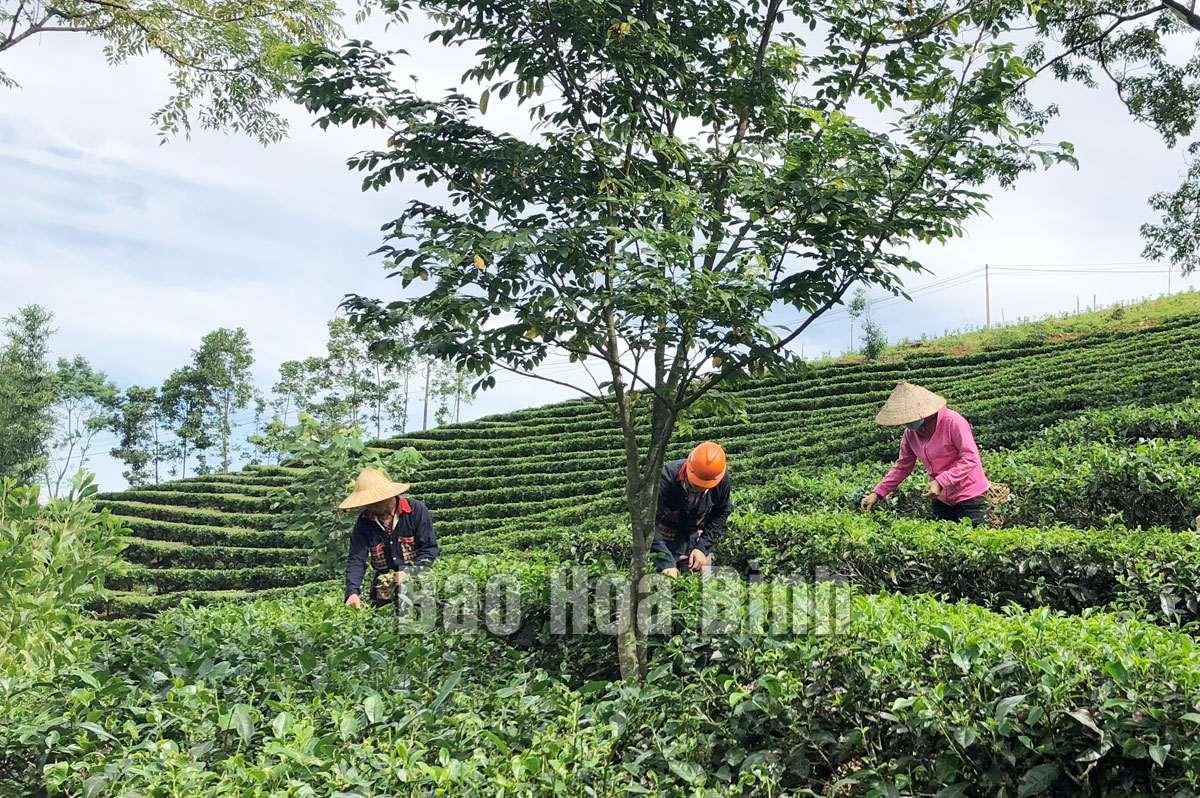
(HBO) - In recent years, the Party Committee and authorities of Hung Son commune (Kim Boi district) have combined resources of State-funded and local programmes for poverty reduction in poorest hamlets. As a result, the living conditions in those areas have been gradually improved, the average income of locals has increased to over 21 million VND/year while the poverty rate has decreased by 8-10 percent/year.

Some households in Ba Ra village, Hung Son commune
(Kim Boi) increase their income by growing tea.
The commune has five poorest hamlets which are Mat,
Bau Cau, Ba Ra, Chi Ngoai, and Suoi Kho. Those five hamlets account for 40
percent of the whole commune's population. In order to create a driving force
for economic development and create momentum for poverty reduction in those
disadvantaged hamlets, the Party Committee and administration of the commune
have mobilised resources to invest in the development of rural transport
infrastructure. Most roads to the five hamlets have been upgraded, facilitating
transport, with only the road from Bau Cau village to Ba Ra still under
construction, with a total investment of 13 billion VND.
Residents in these areas mainly rely on agriculture,
animal husbandry and afforestation for living. The local authorities have
combined policies on supporting ethnic minority areas, the district's poverty
reduction projects and preferential credit programmes to develop local production.
In addition, annually, the commune's Community Learning Center cooperates with
the provincial Center for Vocational Training and Support to open vocational
training classes to provide farmers with knowledge on growing citrus fruit
trees and tea. Many poor and near-poor households also receive support in the
form of fertilizers and seedlings.
According to local authority, Suoi Kho hamlet is the
poorest hamlet in the commune at present, with a household poverty rate of 1.27
percent. Thanks to the support in loans and seedlings, many households have
escaped poverty.
Nguyen Khac Thanh, Chairman of the communal People's
Committee said in the coming time the communal Party Committee and
administration will raise the awareness of local people on self reliance, and
provide training courses for local people on application of science and
technology in farming. The commune aims to provide local farmers with
high-yield, high-quality plant and animal varieties that are suitable for each
area's climatic and soil conditions./.
The emulation movement "Hoa Binh joining hands to build new-style rural areas” has been widely spreading, becoming a driving force that motivates the localities to renew rural landscapes and improve the material and spiritual lives of the residents. In this movement, the people play a central role-both as the main implementers and direct beneficiaries of its outcomes.
In response to the global digital revolution, Hoa Binh Newspaper is transforming itself into a modern and multi-platform media hub, blending cutting-edge technology with a restructured newsroom and a new generation of tech-savvy journalists.
Hoa Binh province’s Association of the Elderly recently held a conference to review the project on expanding the inter-generation self-help club model until 2025.
In a move to implement Resolution No. 57-NQ/TW, issued on December 22, 2024 by the Politburo, which targets breakthroughs in science-technology development, innovation, and digital transformation, the Hoa Binh provincial Department of Health has issued a plan to roll out the "Digital Literacy for All” campaign within the local health sector.
An Nghia Commune (Lạc Sơn District) is one of the communes that achieved the tha standard of the national new rural area in 2018. Entering a new development phase, the commune is now trying to meet the criteria for the advanced new rural development. With the strong political will and the public consensus, the commune is gradually overcoming the challenges to reach this goal, aiming for the sustainable development.



